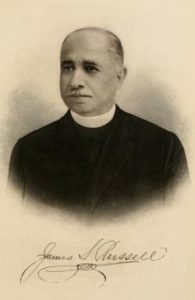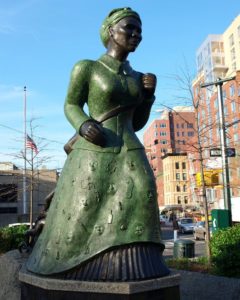Today two saintly souls, both born into slavery, face each other in a heartbreaking Saintly Sixteen battle. James Solomon Russell squares off against Harriet Tubman with a spot in the Elate Eight in the offing. The winner will face Herman of Alaska.
Yesterday Margaret of Castello (IS she related to celebrity blogger Megan Castellan?) defeated Eva Lee Matthews 69% to 31% to reach the Elate Eight.
Don't forget in all of these post-opening round matchups, you can always head to the Bracket tab to read write-ups from previous rounds. Now, perhaps, you have a photographic memory and perfect recall. But for the rest of us, everything is archived in one handy place, because an informed voter is the best kind of voter.
Time to vote!
James Solomon Russell
 James Solomon Russell -- priest, church planter, college president, lived in the early-twentieth century in southcentral Virginia.
James Solomon Russell -- priest, church planter, college president, lived in the early-twentieth century in southcentral Virginia.
Why is this important? If you recall your history, you’ll recall that one of the largest rebellions of enslaved people happened in southcentral Virginia. Right before the Civil War, Nat Turner’s rebellion occurred in the county next door to where the Rev. Russell grew up and ministered. The rebellion, and the declaration of martial law in the aftermath, were a traumatic part of local history for Black Virginians.
Additionally, early on, during the slavery years, many plantation owners in Virginia strenuously resisted anyone evangelizing enslaved people on their plantations, worrying that baptism could become grounds for manumission. Virginia actually passed a law declaring that Christian baptism could not be so used in 1667, which opened the door for widespread evangelizing to enslaved people--mainly in the Great Awakening.
All this is to say that when James Solomon Russell arrived on the scene, he was not dealing with lots of folks who were inclined to leap into the arms of the established Episcopal Church (nor was the established church all that excited to open its arms) which makes what he did all the more remarkable.
James himself was one smart dude. His mother gave him the name Solomon, both because she wanted God’s wisdom for him, and she hoped early on he would be a minister. James grew up in a local church before becoming Episcopalian--the Zion Union Apostolic Church. (This church was one of several that formed immediately after the Civil War, because white parishes started kicking out their formerly-enslaved members, and Black people had to reorganize). At a conference of the ZUAC, James proposed that “No man ought to attempt to read in public who cannot read correctly, nor must one take text who cannot read, nor shall any attempt to preach more than one hour.” The ZUAC fell into infighting, and Russell went to the Episcopal Church partly out of frustration. He wrote, in his memoirs, that the exodus of Black folks from white churches was regrettable because, in his mind, while it was true that the church had failed its black members, if they just stayed put, eventually they would have run the whole Episcopal church just through sheer numbers.
Aside from founding a college and founding 37 churches, Russell also founded a black farmer’s conference in 1904--partly to help sharecroppers to stay out debt and to vote (a poll tax had started in 1902). He also was the first black person appointed to the Episcopal Board of Missions in 1923. He campaigned in 1933 to get all references to race removed from the diocesan canons, to allow all clergy full participation in the governance of the church.
Both North Carolina and Arkansas tried to appoint him their bishop suffragan to minister to their black populations, but he declined--saying both that his work at the college was too important, and that a bishop should be for all people--not just some.
Harriet Tubman
 It is said that Tubman sang songs as signals on the Underground Rail Road. They were Go Down Moses, and, Bound For the Promised Land and Tubman said she changed the tempo of the songs to signify if it was safe for people to come out or not.
It is said that Tubman sang songs as signals on the Underground Rail Road. They were Go Down Moses, and, Bound For the Promised Land and Tubman said she changed the tempo of the songs to signify if it was safe for people to come out or not.
There are many quotes that are attributed to Tubman, all about determination and freedom. However, because she was illiterate, not many of her words were written down but most of the quotes attributed to her share her spirit.
Memorable quotes that were definitely attributed to Tubman include: “I was the conductor of the Underground Railroad for eight years, and I can say what most conductors can't say — I never ran my train off the track and I never lost a passenger.”
Memorable quotes that have been presumed fabricated but contain her spirit include: “If you hear the dogs, keep going. If you see the torches in the woods, keep going. If there's shouting after you, keep going. Don't ever stop. Keep going. If you want a taste of freedom, keep going.
A powerful testament to her life is a letter written by Frederick Douglass to her saying:
The difference between us is very marked. Most that I have done and suffered in the service of our cause has been in public, and I have received much encouragement at every step of the way. You, on the other hand, have labored in a private way. I have wrought in the day – you in the night. I have had the applause of the crowd and the satisfaction that comes of being approved by the multitude, while the most that you have done has been witnessed by a few trembling, scarred, and foot-sore bondmen and women, whom you have led out of the house of bondage, and whose heartfelt, “God bless you,” has been your only reward. The midnight sky and the silent stars have been the witnesses of your devotion to freedom and of your heroism. Much that you have done would seem improbable to those who do not know you as I know you. It is to me a great pleasure and a great privilege to bear testimony for your character and your works, and to say to those to whom you may come, that I regard you in every way truthful and trustworthy.
Oh that we could live our life in such a way.
[poll id="290"]
117 comments on “James Solomon Russell vs. Harriet Tubman”
I'm sorry to have to abandon James, but come on... You can't ignore a quote like this:
"...the most that you have done has been witnessed by a few trembling, scarred, and foot-sore bondmen and women, whom you have led out of the house of bondage, and whose heartfelt, “God bless you,” has been your only reward. "
We should all be so blessed by others!
Still fuming over the fantasy story ( walled up to die, but a maid fed her for 13 years? Ever seen “The Canterbury Ghost”? of yesterday’s winner. Immediately slammed by the most difficult choice thus far. Arrrrgh! Harriet, with God’s grace, will be on the money one day. With true anguish, she’s my choice.
I voted for James, partly because he's not well-known, but mostly for "He campaigned in 1933 to get all references to race removed from the diocesan canons, to allow all clergy full participation in the governance of the church."
Megan, thank you for the fabulous information on James. I am so glad to have met him in this Lent Madness, Nothing against the heroic Harriet, but the quiet persons working within our Church don't get the recognition due them.
What a difficult choice, again. Today my vote was swung by Frederick Douglass, another saint I have been privileged to encounter through Lent Madness.